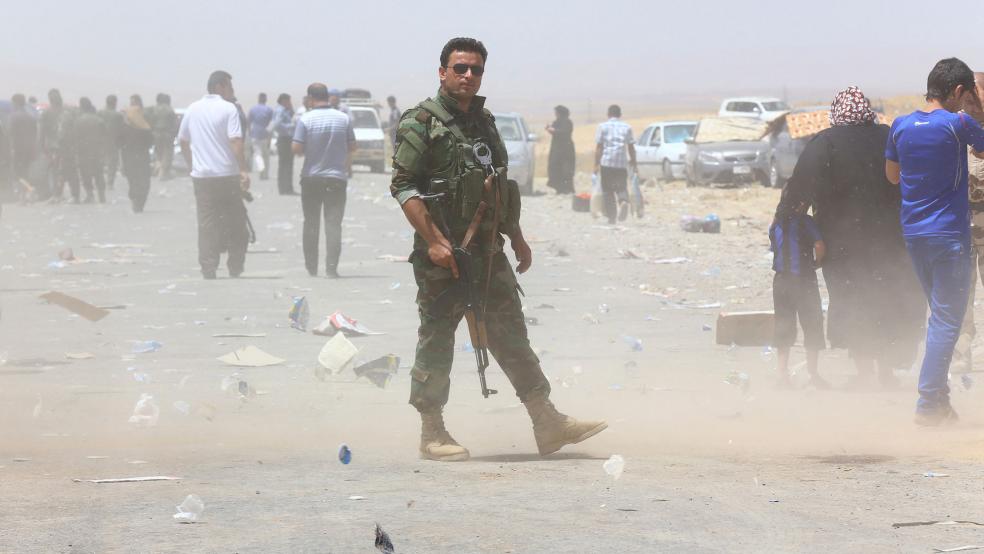The already unbalanced Middle East became more volatile Wednesday, with insurgents from the Islamic State of Iraq and Syria (ISIS) taking Tikrit, another Iraqi city, as they continue their advance to Baghdad.
Whether or not the Iraqi capital could defend itself depends on Iraqi troops who have been deserting en masse even as Prime Minister Nouri al-Maliki reassures Iraqis that the city is safe.
Related: U.S. Watches As Iraq Speeds Toward Disaster
“This is just the latest round of fighting against ISIS, and it won’t be the last,” he said in a televised address. “We will continue to fight against them until we retake Mosul. ISIS doesn’t have the numbers to remain in control of the city.”
This is seemingly wishful thinking by al-Maliki, however, a man who has seen a large swath of his country disappear from his control in a matter of days. The quick advance of the Sunni militants now raises the prospect of yet another chapter in the long history of Sunnis and Shiites, divergent tribes of Muslims who have been fighting one another for centuries.
In effect, the advance has also allowed ISIS to create a new Middle Eastern nation. The group, inspired by al Qaeda but more loyal to its Sunni roots, now controls large portions of southern Syria and northern Iraq, land that’s bigger than many other countries.
ISIS can now effectively rule this area like the Taliban ruled Afghanistan before the 2001 American invasion. The group can create a caliphate and impose sharia law across hundreds of square miles, and the international community - including the United States - would be powerless to stop them, short of sending troops.
Related: U.S. Drones Could Decide the Battle of Fallujah
The ISIS advance will be hard to turn back, experts say. Zaineb Al-Assam, senior Middle East analyst at IHS Country Risk, said it would be difficult to stop ISIS in the coming months.
The group’s “ability to overrun two Iraqi cities within a week represents a substantial shift in capability, and indicates growing intent and capacity to hold territory in the predominantly Sunni northern Iraqi provinces.”
The ISIS advance also highlights one of the greatest failures and worst investments the United States made during the Iraq War. Some $20 billion was spent to train and equip the Iraqi military since the Iraq war.
From reports that have circulated about the group, it’s clear that money spent in the past was wasted. Reuters reported that soldiers charged with protecting Mosul, a city that ISIS took yesterday, simply left when told that insurgents were on their way.
“We can't beat them. We can't. They are well trained in street fighting and we're not. We need a whole army to drive them out of Mosul," one police officer in Mosul said. "They're like ghosts: They appear to hit and disappear within seconds.”
Iraqi security forces also have not been able to retake Fallujah, a city captured by ISIS earlier this year. ISIS is so entrenched in Fallujah that in March, it conducted a military parade through the city’s streets.
Related: Obama's Use of Drones Gives Al Qaeda the Edge in Iraq
Any American money spent on equipping Iraqi soldiers in the future is also likely to go to waste. The Pentagon continues to send aid and equipment to Iraq. According to reports, the weapons and equipment abandoned by Iraqi troops include American Humvees and guns – which ISIS now controls.
The ineptitude and waste of the Iraqi military is certainly not new. Last year, the Special Inspector General for Iraqi Reconstruction (SIGIR) determined that it was unable to pinpoint where $8 billion in military aid to Iraq had gone. The Iraqi military was only in part to blame; DOD’s broken accounting system was also responsible.
“We found that incomplete and unstandardized databases left us unable to identify the specific use of billions of dollars spent on projects, because the U.S. government agencies involved were not required to manage project data in a uniform and comprehensive manner,” SIGIR determined. “While these agencies present broad information on their programs, they did not develop or retain accessible data regarding detailed projects.
The SIGIR report added, “A full accounting, if ever possible, would require combing through mountains of disordered electronic and paper records accumulated since 2003 that are currently stored in multiple locations across many agencies.”
Top Reads from The Fiscal Times:





